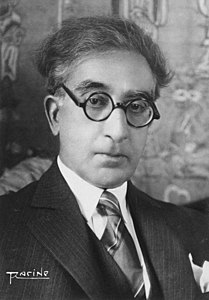Dimaratos
Constantine P. Cavafy 1863 (Alexandria) – 1933 (Alexandria)
His subject, 'The Character of Dimaratos',
which Porphyry proposed to him in conversation
was outlined by the young sophist as follows
(he planned to develop it rhetorically later):
'First a courtier of King Dareios,
and after that of King Xerxes,
now with Xerxes and his army,
at last Dimaratos will be vindicated.
He'd been treated very unjustly.
He was definitely Ariston's son, but his enemies
bribed the oracle brazenly.
And it wasn't enough that they deprived him of his kingship,
but when he finally gave in and decided
to live quietly as a private citizen,
they had to insult him even in front of the people,
they had to humiliate him publicly at the festival.
As a result, he serves Xerxes assiduously.
Along with the great Persian army,
he'll make it back to Sparta too;
and once he's king again, how quickly
he'll throw him out, how thoroughly
he'll shame that schemer Leotychidis.
So now he spends his days full of anxiety,
advising the Persians, explaining
what they should do to conquer Greece.
Much worrying, much thinking, and for this reason
Dimaratos finds his days so burdensome;
much worrying, much thinking, and for this reason
Dimaratos can't find a moment's joy
because what he's feeling can't be called joy
(it isn't; he won't admit it;
how can he call it joy? his distress couldn't be greater)
now things make it quite clear to him
that it's the Greeks who are going to win.'
Font size:
Submitted on May 13, 2011
Modified on April 05, 2023
- 1:18 min read
- 75 Views
Quick analysis:
| Scheme | abacaadedadfebggddhddadiaBjBkklcmn |
|---|---|
| Closest metre | Iambic pentameter |
| Characters | 1,375 |
| Words | 246 |
| Stanzas | 1 |
| Stanza Lengths | 34 |
Translation
Find a translation for this poem in other languages:
Select another language:
- - Select -
- 简体中文 (Chinese - Simplified)
- 繁體中文 (Chinese - Traditional)
- Español (Spanish)
- Esperanto (Esperanto)
- 日本語 (Japanese)
- Português (Portuguese)
- Deutsch (German)
- العربية (Arabic)
- Français (French)
- Русский (Russian)
- ಕನ್ನಡ (Kannada)
- 한국어 (Korean)
- עברית (Hebrew)
- Gaeilge (Irish)
- Українська (Ukrainian)
- اردو (Urdu)
- Magyar (Hungarian)
- मानक हिन्दी (Hindi)
- Indonesia (Indonesian)
- Italiano (Italian)
- தமிழ் (Tamil)
- Türkçe (Turkish)
- తెలుగు (Telugu)
- ภาษาไทย (Thai)
- Tiếng Việt (Vietnamese)
- Čeština (Czech)
- Polski (Polish)
- Bahasa Indonesia (Indonesian)
- Românește (Romanian)
- Nederlands (Dutch)
- Ελληνικά (Greek)
- Latinum (Latin)
- Svenska (Swedish)
- Dansk (Danish)
- Suomi (Finnish)
- فارسی (Persian)
- ייִדיש (Yiddish)
- հայերեն (Armenian)
- Norsk (Norwegian)
- English (English)
Citation
Use the citation below to add this poem to your bibliography:
Style:MLAChicagoAPA
"Dimaratos" Poetry.com. STANDS4 LLC, 2024. Web. 19 Apr. 2024. <https://www.poetry.com/poem/7135/dimaratos>.



Discuss the poem Dimaratos with the community...
Report Comment
We're doing our best to make sure our content is useful, accurate and safe.
If by any chance you spot an inappropriate comment while navigating through our website please use this form to let us know, and we'll take care of it shortly.
Attachment
You need to be logged in to favorite.
Log In